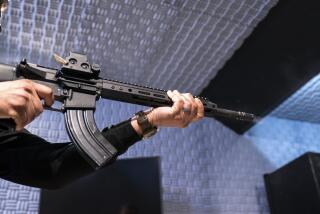Import Ban Extended to All Assault Weapons
WASHINGTON — The White House acted Wednesday to complete a ban on imported assault rifles, adding 24 types of guns to the list of weapons that may not be brought into the country until officials decide whether they are used primarily for sporting purposes.
The additional guns, including two Beretta models and a number of AK-47 look-alikes, had accounted for about 20% of assault-gun imports but were not included among five major categories of weapons barred under an import moratorium imposed a month ago.
The new action was taken principally to counter an increase in applications to import the lesser known assault guns, for which demand has boomed since the moratorium on the more popular models was imposed, officials said.
White House Press Secretary Marlin Fitzwater, whose announcement of the widened weapons ban gave the issue unprecedented prominence, said that the key motivation had been President Bush’s concern about the “use of assault weapons in drug-related crime.”
But Fitzwater acknowledged that the action had been precipitated by a lawsuit filed by a weapons importer, who has demanded that the moratorium be lifted on grounds that its less-than-total effect gave an advantage to his competitors.
Officials at the Bureau of Alcohol, Tobacco and Firearms said the action means that the importation of all “paramilitary-type semiautomatic weapons” will be banned until an Administration policy review is completed. A decision on the ban is expected within the next two months.
Under the guidelines, requests for permits to import the guns are to be rejected and previously approved weapons shipments are to be intercepted at U.S. borders and held by the Customs Service.
The moratorium will have no effect on American-made assault rifles, which can be regulated only through legislation.
The largest U.S. manufacturer of such guns, Colt Industries, has imposed a voluntary ban on sales of its AR-15 rifle. But production by other American gun makers of such weapons as the Ruger Mini-14 and the Street Sweeper has increased. Fitzwater said the increase in domestic production has prompted concern within the Administration.
The initial moratorium, imposed at the behest of national drug policy director William J. Bennett, had banned imports of AK-47-type weapons, the Uzi carbine and three other categories of weapons that accounted for the majority of foreign-made assault guns.
Permits for 400,000 Guns
Alcohol, Tobacco and Firearms officials strengthened the ban two weeks ago after determining that they already had issued permits authorizing gun dealers to import more than 400,000 such weapons in the next six months--a sixfold increase over last year’s import total.
Although saying that they did not expect importers to actually bring that many weapons into the country, the agency ordered the Customs Service to halt such weapons at the border, a directive that essentially revoked the import permits.
Administration officials said Wednesday that no new shipments of the banned weapons had arrived at U.S. ports since the directive went into effect.
Wednesday’s action resulted from another Bureau of Alcohol, Tobacco and Firearms review, which found that the 24 additional types of assault rifles, “by virtue of their general appearance and capabilities,” compete with the previously banned rifles, Fitzwater said.
The Administration’s actions are based on a 1968 law that allows only sporting weapons to be imported into the United States. Administration officials have indicated that they will require importers to prove that the weapons are widely used in hunting and target shooting.
When the Administration imposed the initial assault weapon ban last month--venturing for the first time into the politically sensitive area of limiting access to firearms--the announcement was made in a press release.
In disclosing Wednesday’s action, Fitzwater took the unusual step of allowing television cameras and radio microphones to record his announcement--thus firmly placing the White House imprimatur on the import ban, which has received an unexpected degree of public support.
The lawsuit that forced the Administration action was to be heard today in a Birmingham, Ala., federal court. Government lawyers were expected to cite the widened moratorium to counter the claim of the weapons importer, Gun South Inc., of Trussville, Ala., that the partial moratorium gave his competitors an unfair advantage.
There has been increased public concern about assault rifles since the January massacre at a Stockton, Calif., elementary school, where an unemployed drifter used an AK-47 to kill five children and injure 30 others before killing himself.
Among those testifying Wednesday before a subcommittee of the House Judiciary Committee was the mother of three children who were in the schoolyard but were spared from the gunfire.
“We try to forget the past, but we still dream that he will come and kill us, kill our children,” said the woman, Sanchit Koy, a Vietnamese. “We came to this country to escape from these (weapons). We came here to a peaceful place. The fear has come back.”
Rep. William J. Hughes (D-N. J.), chairman of the subcommittee, said that assault weapons “are designed for one purpose--to kill as many human beings as possible as quickly as possible.”
Staff writers Michael D. Shear and Paul Houston contributed to this story.
More to Read
Sign up for Essential California
The most important California stories and recommendations in your inbox every morning.
You may occasionally receive promotional content from the Los Angeles Times.










